How to view SSL certificate in Chrome, Firefox, Safari and Edge?
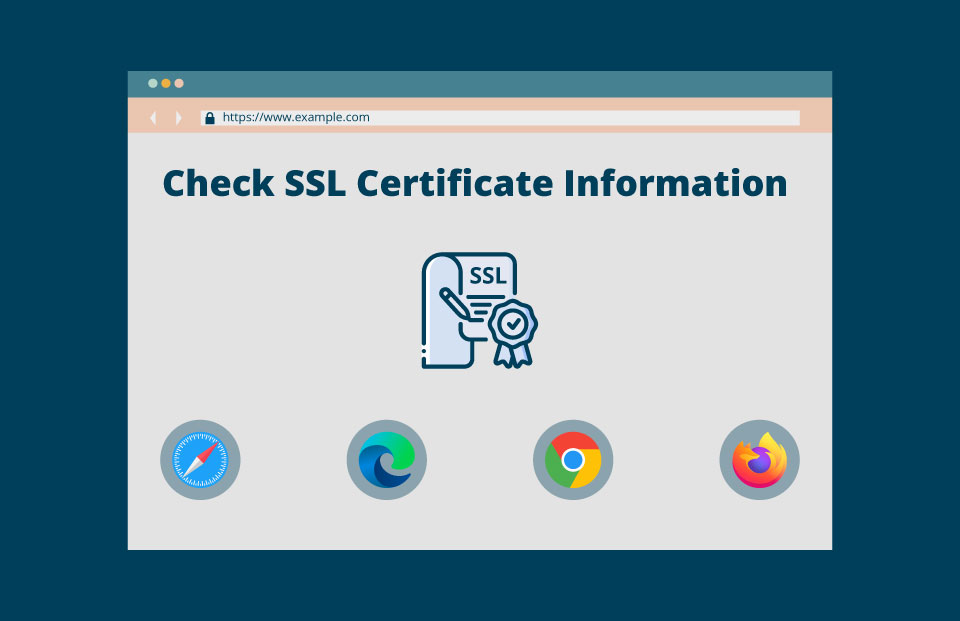
Learn to View the SSL Certificate details in Chrome, Firefox, Safari and Edge Web Browser
Half a decade ago, it was easy to view SSL certificates of websites in order to confirm that the channel was encrypted and the website organization can be trusted. While the 103rd version of Chrome has been rolled out, it has become complex to view the SSL certificate details, so you may be thinking about how to view the SSL certificate in Chrome?
A browser would never stop showing the SSL certificate information since it bond of trust between users and the website. It may have crossed your mind that the browser may have just removed the certificate details. This problem isn’t new. Back when Chrome 56 was rolled out, it was realized that accessing the SSL certificate had become a complex process. But we are here to help you out with that process today.
No matter how much Google explains it to people. The receiving audience has parted in two ways and one chunk is visibly bigger than the other. The users didn’t welcome this move of Google to change how the SSL certificate was viewed earlier warmly. Instead, they gave a very heated reaction that contained some ‘F’ words we think may not be very well to use here. But what we have brought for you today is fantastic. First, let’s skim through the understanding of what the SSL certificate or the website certificate is and how to view the website certificate.
What is an SSL Certificate?
Since there is so much information floating around on the cloud in the current age, user-data safety becomes a primary concern of website owners. Users also need assurance that they are submitting their data to a party that can be trusted.
SSL Certificates are these website certificates that act as a bridge of trust between users and websites. SSL certificates are proof that the website is validated and has an encryption system that keeps the data received from the users private and safe.
- Verification: The SSL certificate is provided to a website once it provides the required information about the business or the person themselves. When the padlock appears on the left side of the URL of a website, it can be said that the website is not certified for the SSL certificate. How to view the website certificate? We will get there in a while.
- Encryption: When a website admin buy a low price SSL certificate, a public key and a private key are provided to it. When a user lands on this website they send encrypted data through their Public key. This information can only be decrypted by the private key that only website has the access to.
How to See the SSL Certificate in Chrome?
The Chrome browser is accessible on wide platforms such as Windows, macOS, Android and iOS. Today we will guide you through the process of accessing the SSL certificate in all these different systems.
Viewing SSL Certificate details on Chrome browser for Windows:
Step 1: In the image below, we can see a padlock on the left side of the Web Address if a website has an SSL certificate. Therefore, the first thing a user needs to do is to check for the padlock.
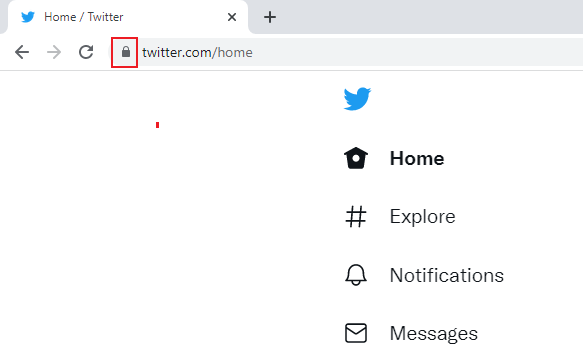
Step 2: Once we have located the padlock, we then need to click on it in order to reach closer to view the SSL certificate.
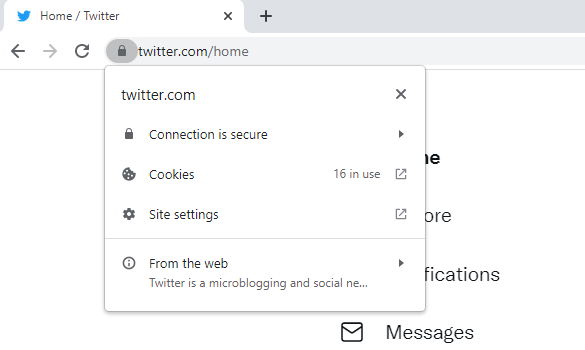
On clicking the padlock, it shows the text that says “Connection is secure”
Step 3: When we click on the “Connection is secure” on the list, we are then taken to a new tab that shows that our passwords, and credit cards i.e., our information stay private when it is sent to Twitter’s website.
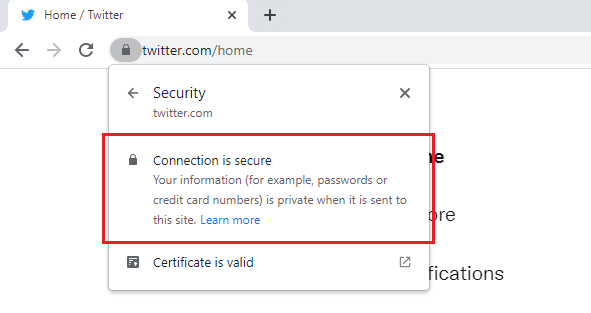
The image also shows the following information:
- Validity of certificate (as shown in image “Certificate is valid”)
- Name of the company the certificate if issued to. In this case, Twitter, INC.
Step 4: Upon clicking the “Certificate is valid” we will be directed to a window that gives the details information about the certificate. Refer the image below for a deeper understanding.
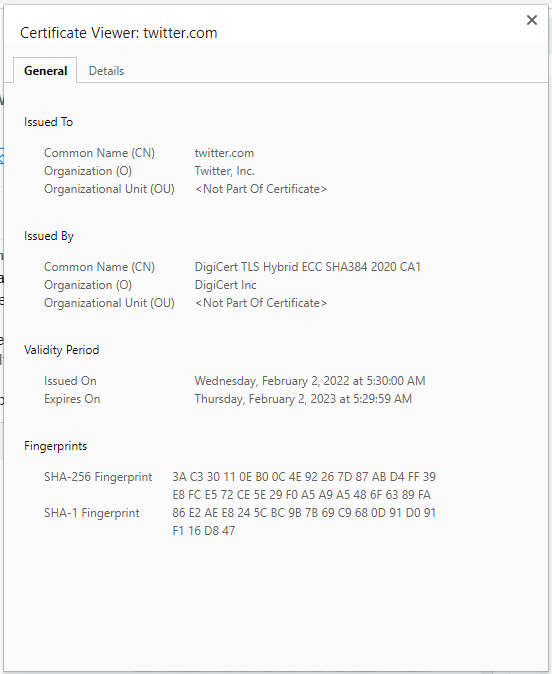
The certificate tab shows the following information:
- The certificate intends to prove the identity of the website/organization to a remote computer (user).
- It ensures the identity of a remote computer.
- The domain to which the certificate is issued. [twitter.com]
- The certificate authority that has issued the certificate.[DigiCert SSL Certificate]
- The validity date of the certificate [Feb 2, 2022 to Feb 2, 2023]
View SSL on Chrome Mobile (Android)
To access the SSL certificate information in Chrome in Android devices:
Step 1: Enter the Web address and locate the Padlock

Step 2: On clicking the padlock, a similar screen appears as we saw in above in Windows Browser section.
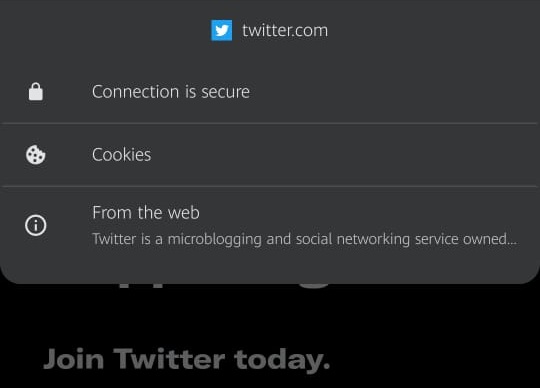
Step 3: Now click on “Connection is secure” from the tab shown in step 2. It shows that Chrome has verified that the website’s certificate is provided by DigiCert.
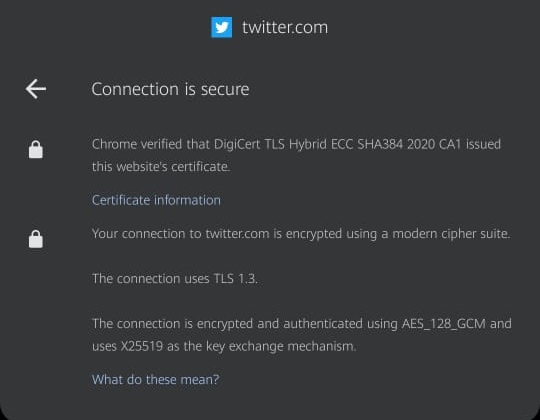
The image shows that the connection built with Twitter’s website uses TLS 1.3 i.e. (TLS is the newer term while SSL is still used because the world has been using it since the beginning of digital security)
Step 4: To get access to the SSL certificate information of Twitter, we now need to click on “Certificate information.” The following screen will appear once we click on it.
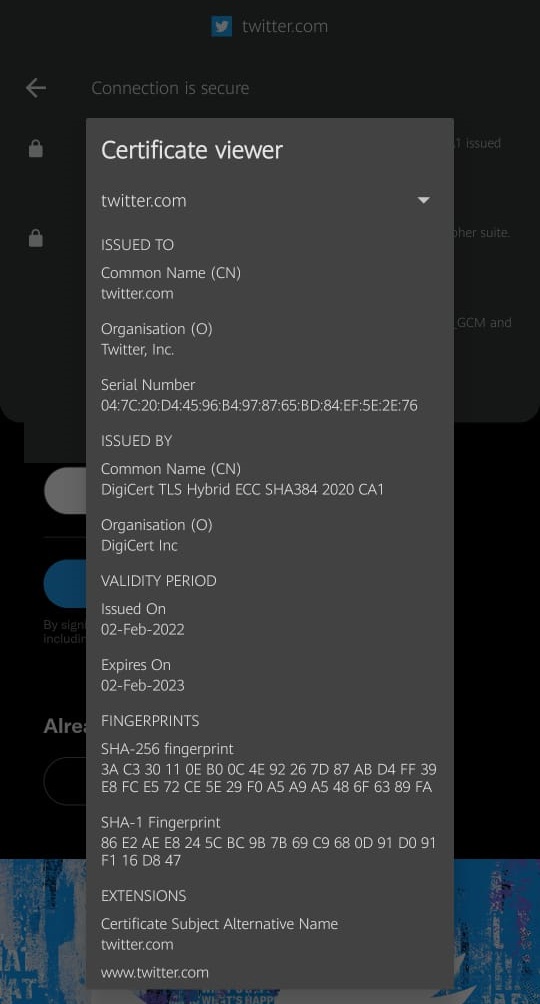
The Certificate viewer then shows the information about the company, the validity of the certificate, the organization’s name and the entity that has provided the SSL certificate to Twitter.
Viewing SSL Certificate in Firefox
Step 1: Enter the Web address and locate the Padlock
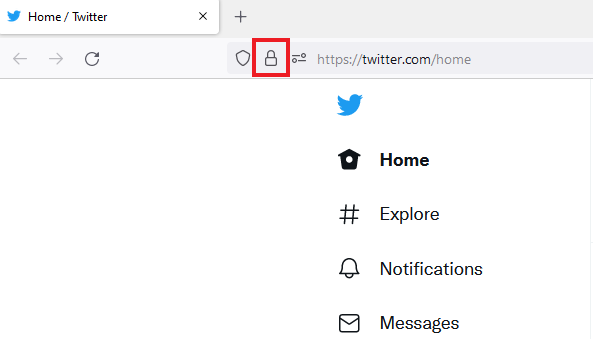
Step 2: On clicking the padlock, a screen appears saying that the Connection is secure.
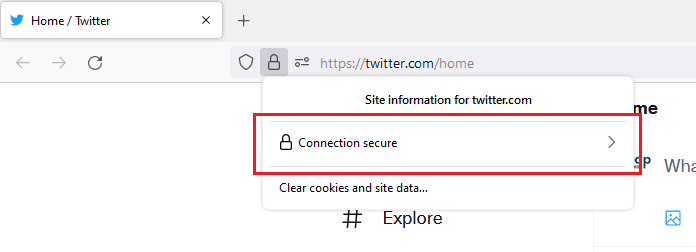
Step 3: Now click on “Connection is secure” from the tab shown in step 2. It shows the location of the Twitter and the entity that has verified it i.e. Digicert Inc.
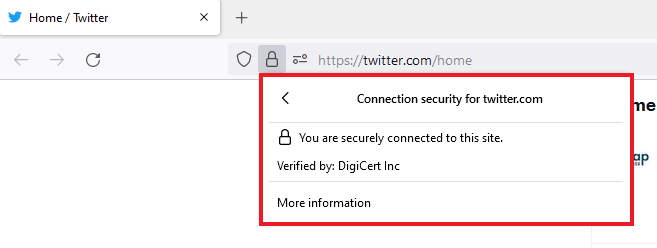
Step 4: To get access to the SSL certificate information of Twitter, we now need to click on “Certificate information.” The following screen will appear once we click on it.
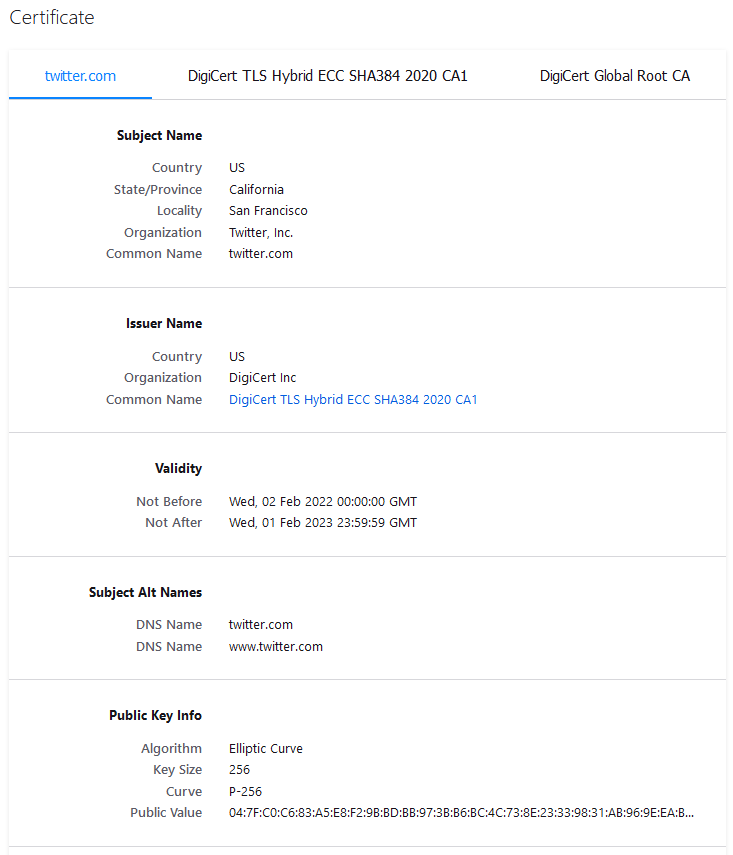
Viewing SSL Certificate in Safari Browser:
Step 1: Visit a website and check whether it has an SSL certificate or not. Do this by locating the padlock near the search/URL bar.

Step 2: Double-click on the padlock shown in the red box in the above image.
Step 3: Now click on “Show Certificate” and then on “Details” to view the certificate details.
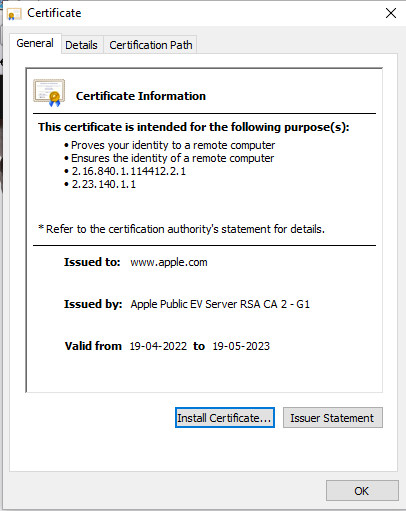
Step 4: The details can be read in the red box shown in the image.
Viewing SSL Certificate in Edge Browser:
Step 1: Visit a website and check whether it has an SSL certificate or not. Do this by locating the padlock near the search/URL bar.
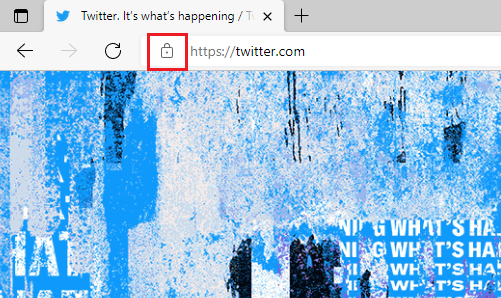
Step 2: Upon clicking the padlock, we get to see the tab shown in the image below.
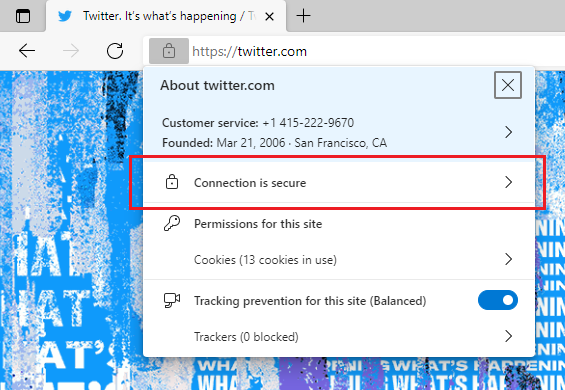
Step 3: Now click on “Connection is secure” and then on the certificate icon on the top right corner to view the certificate.
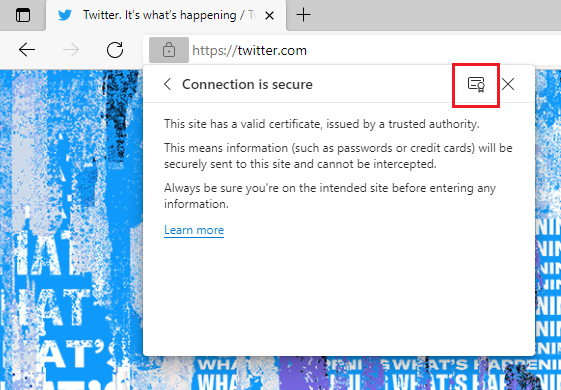
Step 4: Click on the certificate icon in the top right corner on the side of the close button.
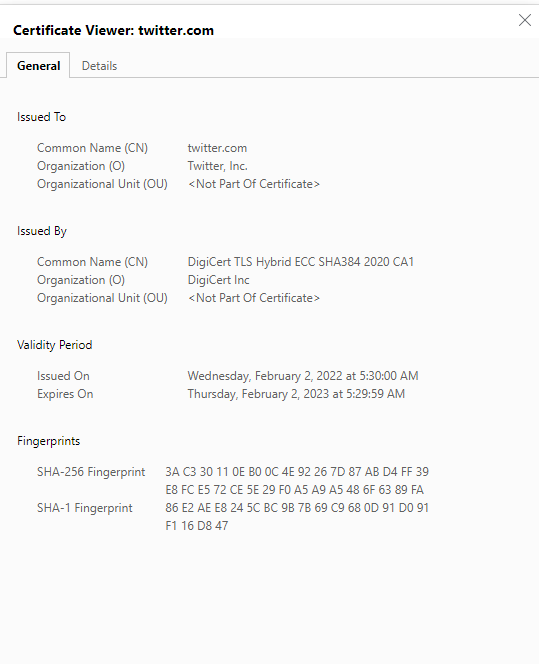
The certificate tab opens in a new window where we can read the website information. It shows various information that includes the website domain to which the certificate is issued to and the authority that has issued the certificate with the validity of the certificate.
What to do when a Website doesn’t have an SSL Certificate?
When a website doesn’t have an SSL certificate, the browser will show a warning sign and message and ask us if we still want to move on the website. Take the website in the image for example.
In a case like this, where a website doesn’t have an SSL certificate, it is better to leave the website. If there are no other alternatives or you want to visit the website anyway, visit the website but provide no personal information you are asked for.
It is advisable to refrain from entering crucial personal information like Social security numbers, email addresses, names, addresses, and credit card or debit card numbers. As the data that we send on this website that does not encrypt the data, our information can as well become a 3 Day-2 Night trip for the DigiBurglars.
Conclusion
Now you know how to view SSL certificate in Chrome. Amidst all the measures that we take in order to protect ourselves from cyber-attacks, we must inspect if our data is safe with the website we are visiting.
As we saw in this article, it doesn’t take a whole lot of time to view the SSL certificate in different browsers. It is understandable that every browser has a different method of viewing the website certificates but you can always come back to this article and guide yourself through the process.
Come on! Act as an inspector before you answer the tons of questions asked by the website to fill in your information.

SECTIGO PositiveSSL certificates – Save Up to 91%
Buy or renew Sectigo PositiveSSL certificate from CheapSSLWeb at a discounted price. Enable HTTPS in minutes.
